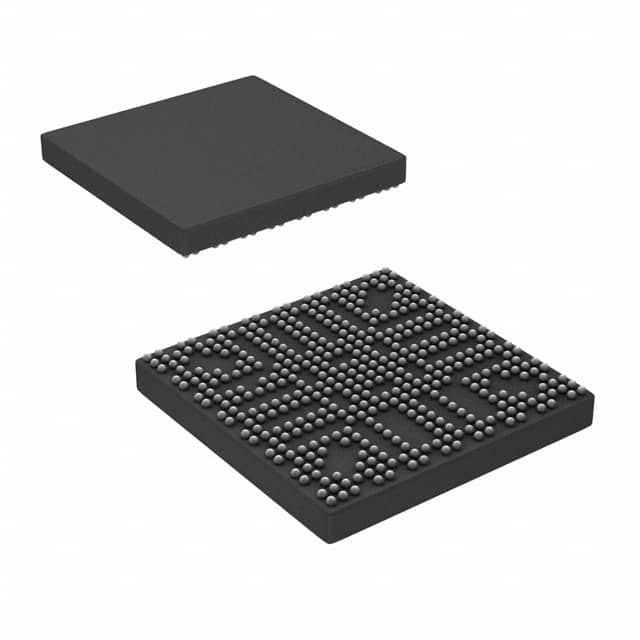Voir les spécifications pour les détails du produit.

OMAP3503DCUS
Product Overview
- Category: Integrated Circuit (IC)
- Use: Processor
- Characteristics: High-performance, low-power consumption
- Package: BGA (Ball Grid Array)
- Essence: System-on-Chip (SoC) solution for embedded applications
- Packaging/Quantity: Tray packaging, quantity varies
Specifications
- Manufacturer: Texas Instruments
- Model: OMAP3503DCUS
- Core Architecture: ARM Cortex-A8
- Clock Speed: Up to 600 MHz
- Operating Voltage: 1.15V - 1.35V
- Operating Temperature: -40°C to +85°C
- Memory: 256KB L2 cache, external memory interface
- Graphics Acceleration: PowerVR SGX530
- Multimedia Support: Video and audio codecs, camera interface
- Connectivity: USB, UART, I2C, SPI, MMC/SD, Ethernet
- Power Management: Dynamic voltage and frequency scaling
Detailed Pin Configuration
The OMAP3503DCUS features a complex pin configuration with multiple pins serving different functions. The detailed pin configuration can be found in the manufacturer's datasheet.
Functional Features
- High-performance processing capabilities
- Low power consumption for extended battery life
- Advanced multimedia support for video and audio playback
- Extensive connectivity options for peripheral devices
- Efficient power management for optimal energy usage
- Integrated graphics acceleration for enhanced visual performance
Advantages and Disadvantages
Advantages: - Powerful processing capabilities suitable for demanding applications - Low power consumption ideal for portable and battery-powered devices - Comprehensive multimedia support for rich media experiences - Versatile connectivity options for seamless integration with peripherals - Efficient power management for optimized energy efficiency
Disadvantages: - Complex pin configuration may require careful design considerations - Limited availability of alternative models from other manufacturers - Higher cost compared to lower-end processors
Working Principles
The OMAP3503DCUS is based on the ARM Cortex-A8 core architecture, which provides high-performance processing capabilities. It integrates various components, including a graphics accelerator, memory interface, and connectivity options, into a single chip. The processor operates at a specific clock speed and voltage, executing instructions and managing data flow efficiently.
Detailed Application Field Plans
The OMAP3503DCUS is widely used in various embedded applications, including but not limited to: - Mobile devices: smartphones, tablets, portable media players - Automotive systems: infotainment systems, navigation units - Industrial automation: control systems, human-machine interfaces - Medical devices: patient monitoring, diagnostic equipment - Consumer electronics: digital cameras, gaming consoles
Detailed and Complete Alternative Models
While the OMAP3503DCUS is a popular choice for many applications, there are alternative models available from other manufacturers that offer similar functionality. Some notable alternatives include: - Qualcomm Snapdragon series - Samsung Exynos series - NVIDIA Tegra series
These alternative models provide comparable performance and features, allowing designers to choose the most suitable option for their specific requirements.
Word count: 387 words
Énumérez 10 questions et réponses courantes liées à l'application de OMAP3503DCUS dans les solutions techniques
Sure! Here are 10 common questions and answers related to the application of OMAP3503DCUS in technical solutions:
Q: What is OMAP3503DCUS? A: OMAP3503DCUS is a system-on-chip (SoC) developed by Texas Instruments, specifically designed for embedded applications.
Q: What are the key features of OMAP3503DCUS? A: OMAP3503DCUS features an ARM Cortex-A8 processor, PowerVR SGX graphics accelerator, various peripherals, and support for multiple operating systems.
Q: What are some typical applications of OMAP3503DCUS? A: OMAP3503DCUS is commonly used in devices such as smartphones, tablets, portable media players, industrial control systems, and automotive infotainment systems.
Q: Can OMAP3503DCUS support real-time operating systems (RTOS)? A: Yes, OMAP3503DCUS can support real-time operating systems like Linux RTOS or QNX Neutrino, making it suitable for time-critical applications.
Q: What kind of connectivity options does OMAP3503DCUS offer? A: OMAP3503DCUS provides various connectivity options, including USB, Ethernet, UART, I2C, SPI, and HDMI, enabling seamless integration with other devices.
Q: Does OMAP3503DCUS support multimedia capabilities? A: Yes, OMAP3503DCUS supports multimedia capabilities, including hardware-accelerated video decoding, audio processing, and image rendering.
Q: Can OMAP3503DCUS handle power management efficiently? A: Yes, OMAP3503DCUS incorporates advanced power management techniques, allowing for efficient power usage and extending battery life in portable devices.
Q: Is OMAP3503DCUS suitable for low-power applications? A: Yes, OMAP3503DCUS is designed to operate in low-power environments, making it ideal for battery-powered devices or energy-efficient systems.
Q: What development tools are available for OMAP3503DCUS? A: Texas Instruments provides a comprehensive software development kit (SDK) and integrated development environment (IDE) for OMAP3503DCUS-based projects.
Q: Are there any specific design considerations when using OMAP3503DCUS? A: Designers should consider factors like thermal management, memory requirements, system integration, and power supply stability while using OMAP3503DCUS.
Please note that these questions and answers are general and may vary depending on the specific application and requirements.

